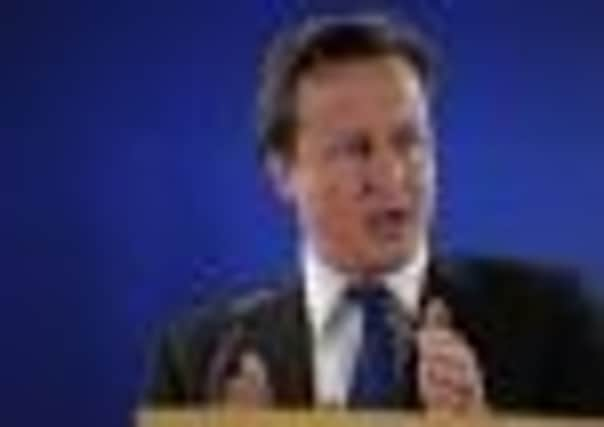Referendum ‘damaging to prospects of growth’


The motion was overwhelmingly defeated by 483 votes to 111 against the motion, and was opposed by the leaders of all three main political parties.
But around 80 Tory MPs ignored pleas during the five--hour debate by the Prime Minister not to vote against the government – the largest Conservative rebellion so far in this parliament, and also the biggest ever rebellion on Europe for the party while in government.
Advertisement
Hide AdAdvertisement
Hide AdThe rebellion exceeded that over the Maastricht Treaty, when 41 Tories voted against John Major’s government in 1993.
During last night’s bruising exchange, Tories Adam Holloway and Stewart Jackson effectively handed in resignation notices from their posts as ministerial aides, as they told the Commons they would support the motion.
Before the debate, the Prime Minister had used a Commons statement to stress the importance of the EU to Britain’s economy, but insisted he shared his backbenchers’ desire for fundamental reform.
Mr Cameron said it was “not the right time – at this moment of economic crisis – to launch legislation that includes an in/out referendum”.
“When your neighbour’s house is on fire, your first impulse should be to help him put out the flames, not least to stop the flames reaching your own house,” he said. “This is not the time to argue about walking away. Not just for their sakes, but for ours.
“Legislating now for a referendum, including on whether Britain should leave the EU, could cause great uncertainty and could actually damage our prospects of growth.”
Membership of the European Union was vital for “millions of jobs and millions of families”, he added.
The debate was granted to Tory David Nuttall by the Commons back-bench business committee in response to a petition signed by more than 100,000 people.
Advertisement
Hide AdAdvertisement
Hide AdThe motion tabled by Mr Nuttall called for the government to legislate to hold a referendum on whether the UK should remain in the EU, leave the union or renegotiate the relationship with Brussels to focus on trade.
Mr Nuttall said there was a feeling that parliament was becoming “impotent” compared with the weight of legislation and regulation coming from Europe.
Mark Pritchard, secretary of the powerful Conservative 1922 committee, said the debate would be “a defining moment for many MPs who have for years called themselves eurosceptic”.
Foreign Secretary William Hague admitted the issue came at “a critical time in European affairs”, but said: “Tonight’s proposition is the wrong one at the wrong time.”
Labour leader Ed Miliband likened the Tories’ divisions of Europe to a rerun of an old movie, calling the Conservatives an “out-of-touch party tearing itself apart over Europe”. However, he did agree with the Prime Minister that it was the wrong time for a referendum.
Shadow foreign secretary Douglas Alexander also opposed the motion, but said Tory MPs’ “disappointment in their front bench was so great because their hopes were so high” as a result of eurosceptic rhetoric from the leadership in opposition.
Mr Jackson, parliamentary private secretary (PPS) to Northern Ireland Secretary Owen Paterson, told MPs that he backed the motion and would “take the consequences”. He said: “For me constituency and country must come before the baubles of ministerial office.”
Mr Holloway, PPS to Europe minister David Lidington, said: “If you can’t support a particular policy then the honest course of action is of course to stand down, and I want decisions to be made more closely by the people they affect, by local communities, not upwards towards Brussels.”
Advertisement
Hide AdAdvertisement
Hide AdTory Sam Gyimah, a self-proclaimed eurosceptic, said he would oppose the referendum. “Anger and frustration is not enough. We need a clear-eyed, clear-sighted strategy,” he said.
“While we can all stand for our principles and say it’s about our principles and conscience. what we need to remember in the reality of the political world is that if we want to achieve something we need to balance these factors.”
He said when voters kicked the Conservatives out of government in 1997, the country suffered the “greatest setback” in the European project.
Tory Mark Reckless said Lib Dems in the coalition had been granted a referendum on the alternative vote system as a reward for their membership of the government. However, he added: “A far larger number on the Conservative benches have not been given the referendum we want on our country’s position in the EU.”
Following the vote, Ukip leader Nigel Farage described the result as a “bad day for Britain”: “Defeat was inevitable given that MPs knew full well how their leaders wanted them to vote.
“However, 111 is a healthy figure that should send a clear message to David Cameron and the other party leaders.
“Today was a bad day for Britain as the people of the UK have been denied the referendum they so desperately crave.
“Poll after poll shows the people either want out of the EU or to radically change the UK’s relationship with the EU.
Advertisement
Hide AdAdvertisement
Hide Ad“Tonight the UK’s political elite has snatched that opportunity away from them and denied people a vote. We should not forgive them.”
Supporting the motion, Tory Peter Bone quoted Mr Cameron from 2009.
Mr Bone was cheered by Labour MPs as he recalled how the Tory leader urged for powers to be returned to the people.
He said: “I am going to take the advice of my Prime Minister when he encouraged every Member to be independent-minded, to put his country first and to put narrow party interests last.
“I say, ‘Well done Prime Minister’. I will be voting by conscience tonight.”